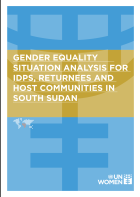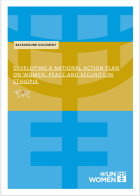1 - 8 of 8 Results
Date:
As gaps remain in efforts to stem the tide of global economic crises, having fiscal policies in place to safeguard spending for women is essential. Gender Responsive Budgeting (GRB) can ensure a gender-equitable allocation of resources and expenditure tracking to promote gender equality. This briefing note provides information on the foundation established to determine entry points for this work, key partnerships, and plans to advance systemic financing for gender equality in the country.
Date:
Drawing from experiences in other countries, this document describes the main steps of the process, the possible challenges and the keys to success in developing a National Action Plan on Women, Peace and Security in Ethiopia.
Date:
The transition to a green economy will create many new jobs around the world, including in sub-Saharan Africa. But will women share-in these new jobs, and will the economic transformation help them move into higher-paid, more stable jobs that require more education and skills? The short answer is “yes” – provided countries adopt strong policies and programmes to make it happen. The green economy transition is attracting attention in policy circles but its potential gender...
Date:
In Nigeria, women remain drastically underrepresented in peace processes. This is not entirely due to lack of capacity, but also due to lack of power and access as patriarchy plays a key role in excluding women from formal and informal peace processes. The report is a situational analysis of the participation of women as mediators in conflict resolution in Nigeria. It presents an in-depth understanding of the gaps and challenges of women mediators in the specific context of each of the six...
Date:
Studies have been carried out to investigate the historical, security, political economy, environmental and humanitarian dimensions of the farmer–herder conflict, but very little attention has been paid to women’s participation in formal and informal mediation processes in the protracted conflict between farmers and herders. It is against this backdrop that this assessment seeks to fill this gap by providing on-the-ground evidence from Kaduna and Plateau States. Broadly speaking,...
Date:
On 25 September On 25 September2015, the United Nations General Assembly adopted the 2030 Agenda for Sustainable Development as the agreed framework for international development. It is the successor to the Millennium Development Goals (MDGs). However, unlike the MDGs, the 2030 Agenda presents a much wider scope by deliberately and more fully incorporating economic and environmental sustainability, as well as the aspiration of many countries for peaceful and inclusive societies.
Date:
This assessment looked at the implementation of United Nations Security Council Resolution 1325 (UNSCR 1325) in humanitarian settings in Ethiopia. Both primary and secondary data analyses were performed. For primary data collection, a total of 27 in-depth face-to-face interviews were conducted with representatives of government, UN-agencies and foreign and resident charities that are working in refugee settings.
Date:
BACKGROUND: The United Nations Entity for Gender Equality and Women’s Empowerment (UN Women) through gener-ous support by the Austrian Development Agency (ADA) in September 2015 conducted an assessment to evaluate the im-plementation of the United Nations Security Council Resolution 1325 (UNSCR1325) in humanitarian settings in Ethiopia, targeting in particular the refugee camps in Shire and Gambella. The assessment was led by UN Women and benefited from technical inputs by members of the...







